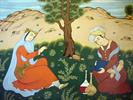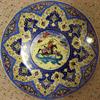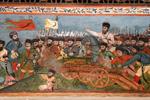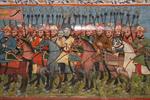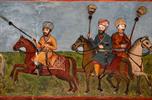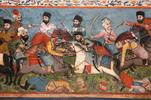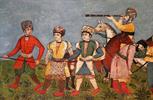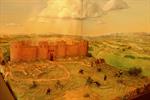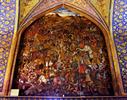Azerbaijan was the original paradise. But since the fall of Eden and the crashing of Noah's Ark through the peak of Ilan Dag, it has ridden a historical and political roller-coaster. Always at the edge of somebody else's patch, overlordship has been dragged to and fro between empires whether Roman, Parthian, Persian, Arab, Georgian, Mongol, Turkish or Russian. Conquerors not only conquered but in medieval tradition, often killed or moved whole populations, carrying women and craftsmen back to the imperial capitals and substituting their own herdsmen to exploit the land. The most significant influx was the various waves of Turkic nomads who have come to form the main ethnic element in today's Azeri population.
The area of today's Azerbaijan Republic has historically been known variously as Aran, Aghvan, Caucasian Albania and more recently Shirvan. Until the 20th century the ancient term Azerbaijan applied largely, as it still does, to the ethnically fraternal territory centred on Tabriz and Ardabil in Iran.
Over the last two millennia it's not just the country's name and rulers that have changed but also its religion, language and even its predominant ethnicity. And having spent most of that time straddling the territories of competing empires, understanding this extraordinary saga really requires getting to grips with Persian, Arab, Turkish and Russian history. No wonder visitors (and even Azeris themselves) get confused.
Even if all this seems dry and irrelevant to you, be aware that throughout the Caucasus, ancient history remains a point of day-to-day controversy and is constantly being re-remembered.
As no explicitly Azerbaijani state existed until 1918, getting a feel for the phenomenally rich and complex historical background requires one to grapple with a melting pot of peoples, religions and several poorly defined mini states which have come and gone over time. Confusingly the most abiding of these was known as Albania, though it has nothing to do with today's European Albania (Shqiperia). Another key entity was Shirvan ruled by the Shirvanshahs and based mostly at Shamakha and Baku. Inevitably much Azeri historical source material is focused on the southern region of Azerbaijan which has been part of Iran/Persia. Since 1828 Azerbaijan's most historically important cities are now outside its borders - Tabriz and Ardebil in Iran, Derbend in Russia.
Another key point to note is that the ethnic 'Turks', waves of whom progressively came to populate Azerbaijan, came from Central Asia, not from 'Turkey'. Indeed it was via Azerbaijan that some Turks may have reached Anatolia (Turkey) which was previously a predominantly Greek-Byzantine land. Persians (Iranians) and Turks who we now associate with Islam were not necessarily Muslims earlier in history and certainly not before the 7th century as Mohammad didn't start preaching till 610. However, after Mohammad's death in 632, the Arabs led by a combined political/ spiritual leader ('Caliph') are indeed largely synonymous with Islam which they spread systematically in the vast empire they rapidly built up (until toppled by the Seljuk Turks in 1055).
A most confusing aspect is the way that empires come and go, yet for centuries the little principalities, and petty nobles wielding regional power, continually pop up again apparently relatively unaffected by years or even centuries of foreign overlordship. Historians have suggested that the inability of these lords to agree or for one to out do all the rest explains why they were so frequently subservient to others and also why Azerbaijan was never an aggressive empire-building state.
Beware of the term 'Tatar' which correctly refers to the descendants of Mongol-Turkic Golden Horde, now settled mostly around Kazan in the Russian Federation (Tatarstan). There was also a considerable Tatar population in Crimea, now mostly scattered. In the 19th century the term Tatar was widely but inaccurately applied to the Muslim-Turkic population of the east Caucasus - today's Azeris.



